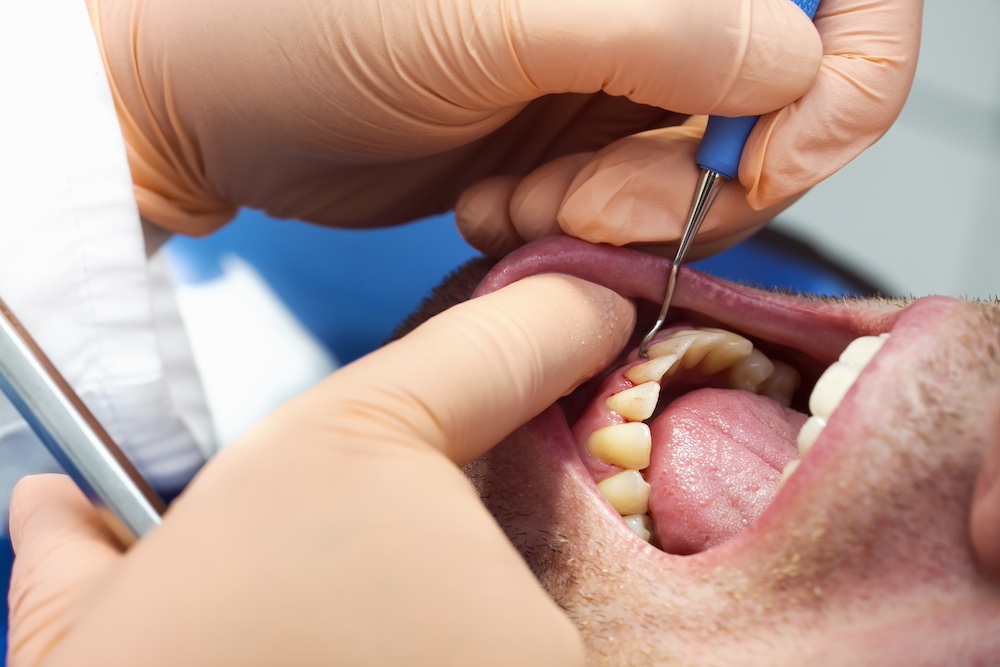We’ve all heard from our dentists that a healthy mouth is indicative of good overall health—and that is quite literally the case when it comes to your heart. Periodontal disease, a common yet often underestimated oral condition, has emerged as a potential contributor to heart issues. Studies have shown a direct correlation between periodontal disease and heart health, making it critical that people understand what periodontal disease is, its causes, treatments, risk factors, and the serious cardiac complications that can arise when it goes untreated.
Understanding Periodontal Disease
Periodontal disease, otherwise known as gum disease, is an inflammatory condition that affects the teeth, including the gums, alveolar bone, and periodontal ligaments. Gingivitis and periodontitis are the two most prevalent types of periodontal disease.
Gingivitis is the earliest stage of periodontal disease and is characterized by inflammation and bleeding of the gums. It is caused by the accumulation of plaque, a sticky film of bacteria that forms on teeth and gums. Gingivitis is usually reversible with proper oral hygiene, including regular brushing and flossing and professional dental cleanings.
If gingivitis is left untreated, it can progress into periodontitis, a more severe form of the disease. In periodontitis, the inflammation extends deeper into the supporting structures of the teeth, leading to gum recession, pocket formation, and loss of bone around the teeth. Periodontitis requires more intensive treatment, including scaling and root planing, antibiotic therapy, and sometimes surgical intervention.
Causes of Periodontal Disease
Periodontal disease is caused by the interaction of dental plaque and the body's immune system.
Several factors contribute to the development of periodontal disease:
- Poor Oral Hygiene – Inadequate brushing and flossing allow plaque to accumulate on the teeth and gums, leading to inflammation
- Smoking and Tobacco Use – Tobacco products limit blood flow to the gums, and reduce the body's ability to fight infection, therefore increasing the risk of periodontal disease
- Genetics – Some individuals may have a genetic predisposition to periodontal disease
- Medical Conditions – Certain medical conditions such as diabetes, autoimmune disorders, and HIV/AIDS can weaken the immune system and increase the risk of gum disease
- Medications – Medications, such as those that reduce saliva flow, can contribute to a dry mouth, which promotes plaque buildup
- Hormonal Changes – Hormonal fluctuations during pregnancy, menstruation, and menopause can make gums more sensitive and prone to inflammation
- Poor Nutrition – A diet lacking in essential nutrients can weaken the immune system and hinder the body's ability to combat gum infections
The Link Between Periodontal Disease and Heart Health
Recent research has shed light on the connection between periodontal disease and heart health. While the exact mechanisms underlying this association are still being studied, several theories have emerged:
- Inflammatory Response – Periodontal disease is characterized by chronic inflammation, and it is believed that the body's inflammatory response may contribute to the hardening of the arteries—a key risk factor for heart disease.
- Bacterial Translocation – Periodontal bacteria can enter the bloodstream through the inflamed gums and travel to other parts of the body, including the heart. These bacteria may contribute to the formation of arterial plaques, further increasing the risk of heart disease.
- Systemic Inflammation – Chronic inflammation in the gums may trigger an inflammatory response, which can negatively affect the cardiovascular system, leading to cardiac dysfunction and arterial stiffness.
Current Statistics
The statistics regarding periodontal disease and its potential impact on heart health are sobering. According to the American Academy of Periodontology (AAP) and the American Heart Association (AHA):
- More than 47% of U.S. adults aged 30 and older have some form of periodontal disease
- Individuals with periodontal disease may have a 20% higher risk of developing coronary artery disease (CAD)
- Periodontal disease has been associated with an increased risk of stroke, with some studies suggesting a nearly 2x higher risk in individuals with severe gum disease
- Individuals with periodontal disease have a 14% higher risk of experiencing a heart attack
- Periodontal disease can also increase the risk of infective endocarditis, a potentially life-threatening infection of the heart's inner lining
Risk Factors of Periodontal Disease
To better understand the connection between periodontal disease and heart health, it is essential to recognize the risk factors associated with gum disease:
- Those who fail to adequately or properly brush and floss, allowing plaque accumulation
- Smokers and other tobacco users with impaired gum health
- Diabetics who are at higher risk for gum disease due to uncontrolled blood sugar levels
- Individuals with heart disease who are more likely to have periodontal disease, with the presence of both conditions worsening outcomes
- Those taking certain medications, such as antihypertensive drugs and antipsychotic medications, which cause dry mouth and increase the risk of gum disease
- Older adults with cumulative effects of poor oral hygiene over time
- Those with weakened immune systems due to chronic stress
- Women who are pregnant or in menopause, due to hormonal changes
- Individuals may have a genetic predisposition to gum disease
Treatment and Management
Fortunately, periodontal disease can be effectively managed and treated, reducing its impact on both oral and systemic health.
Periodontal disease treatment options include:
- Regular dental cleanings to remove plaque and tartar that cannot be eliminated through brushing and flossing alone
- Scaling and root planing to remove tartar and bacteria from below the gum line and smooth the tooth root surfaces to prevent further buildup
- Antibiotics to control bacterial infections associated with periodontal disease
- Surgical procedures such as flap surgery, bone grafting, or tissue regeneration to restore gum and bone health
- Quitting smoking, managing chronic conditions like diabetes, and maintaining a healthy diet to support gum health
- Daily brushing and flossing to prevent plaque buildup and maintain oral health
The connection between periodontal disease and heart health underscores the importance of oral hygiene and regular dental care as an essential part of overall well-being. It is essential for individuals to be aware of the risk factors associated with periodontal disease, seek timely treatment, and adopt lifestyle habits that promote oral health. By doing so, we can take a significant step toward reducing heart disease.
At Burke Dental located in Burke, VA, we are committed to providing comprehensive periodontal disease treatment with personalized care to ensure your optimal oral health and overall well-being.



